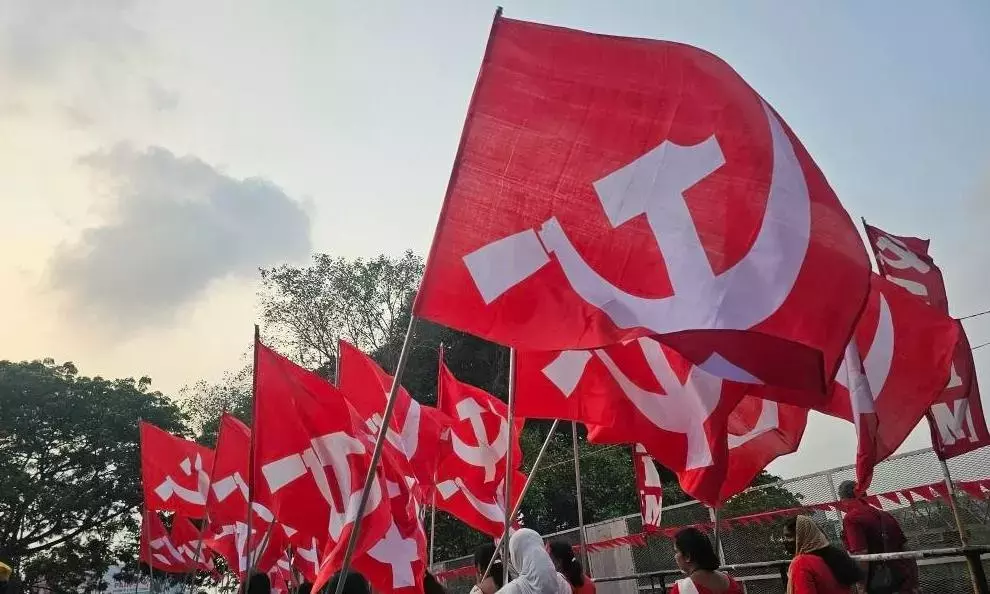Mumbai : The Communist Party of India (Marxist) (CPI(M)) recently faced a sharp rebuke from the Bombay High Court for its attempt to organize a protest at Mumbai’s Azad Maidan against the alleged “genocide” in Gaza. The court’s dismissal of the petition, coupled with its scathing remarks, has sparked a necessary debate about the priorities of political organizations like the CPI(M) and their relevance in addressing India’s pressing domestic challenges. The court’s directive to “be patriots” and focus on local issues like garbage, flooding, and illegal parking instead of international conflicts thousands of miles away is not just a legal ruling but a clarion call for introspection. This article critiques the CPI(M)’s approach, arguing that its focus on foreign issues while ignoring India’s immediate concerns reflects a disconnect from the nation’s realities and a failure to uphold its constitutional responsibilities as a political entity.
The Context of the Court’s Ruling
On July 25, 2025, the Bombay High Court, presided over by Justices Ravindra Ghuge and Gautam Ankhad, dismissed a petition filed by the CPI(M) challenging the Mumbai Police’s refusal to grant permission for a protest at Azad Maidan. The protest was intended to condemn the ongoing conflict in Gaza, which began in October 2023 following Hamas’ attacks on Israeli cities and Israel’s subsequent military offensive. The court’s reasoning was twofold: first, it questioned the CPI(M)’s legal standing (locus standi) to challenge the police’s decision, as the original application for the protest was filed by the All India Peace and Solidarity Foundation (AIPSF), not the CPI(M) itself. Second, and more significantly, the court criticized the party’s priorities, urging it to address domestic issues rather than focusing on a conflict that, in its view, does not directly affect Indian citizens. The bench’s remarks, such as “Look at your own country. Be patriots. This is not patriotism,” have resonated widely, exposing the CPI(M)’s skewed focus and prompting a broader critique of its political strategy.
CPI(M)’s Misplaced Priorities
The CPI(M)’s decision to prioritize a protest over the Gaza conflict, while neglecting India’s myriad domestic challenges, underscores a troubling disconnect from the lived realities of Indian citizens. India faces a host of pressing issues—urban flooding, inadequate waste management, crumbling infrastructure, unemployment, and rising inequality—that demand urgent attention from political organizations. Mumbai, where the proposed protest was to take place, is a city plagued by annual monsoon-related flooding, illegal encroachments, and chronic traffic congestion. These are not abstract concerns but tangible problems that affect millions of lives daily. Yet, the CPI(M) chose to channel its energies into a geopolitical issue that, while serious, is far removed from the immediate needs of its constituents.
The court’s suggestion that the CPI(M) focus on “garbage, illegal parking, flooding, and drainage” was not merely a rhetorical jab but a pointed reminder of the party’s failure to address issues that directly impact Indian citizens. For a party that claims to champion the working class and marginalized communities, this focus on international conflicts over local crises is particularly jarring. The CPI(M)’s advocates, including Senior Counsel Mihir Desai, argued that the party has been active in organizing health and education camps across India, suggesting a commitment to domestic welfare. However, these efforts pale in comparison to the party’s vocal advocacy for foreign causes, which often seem designed to garner political capital rather than effect meaningful change.
The Question of Patriotism
The court’s invocation of “patriotism” has sparked controversy, with the CPI(M) condemning the remarks as “unconstitutional” and “politically biased.” The party argued that its solidarity with the Palestinian cause aligns with India’s historical support for Palestine, as evidenced by India’s vote in favor of a 2024 UN Human Rights Council resolution on Palestinian self-determination. While the CPI(M)’s commitment to global solidarity is not inherently wrong, the court’s critique raises a valid question: does a political party registered in India have a primary responsibility to address the needs of its own citizens before taking up international causes?
Patriotism, in this context, is not about blind nationalism but about prioritizing the welfare of one’s own people. The CPI(M)’s decision to focus on Gaza, while ignoring local issues like Mumbai’s chronic flooding or the plight of informal workers, suggests a selective activism that undermines its credibility as a people’s party. The court’s remarks, though sharp, reflect a broader sentiment: political organizations must be accountable for addressing the immediate concerns of their constituents. By choosing to protest an issue that aligns with its ideological leanings but has little direct relevance to Indian citizens, the CPI(M) risks alienating the very people it claims to represent.
The Diplomatic Implications
The Bombay High Court also cautioned that protests on sensitive international issues like Gaza could have unintended diplomatic repercussions. Justices Ghuge and Ankhad noted that such demonstrations could “kick up dust” and affect India’s foreign relations, particularly when the CPI(M)’s stance diverges from the government’s foreign policy. India has maintained a balanced approach to the Israel-Palestine conflict, advocating for a two-state solution and providing humanitarian aid to Gaza while maintaining diplomatic ties with Israel. The CPI(M)’s attempt to stage a protest could be seen as undermining this delicate balance, potentially complicating India’s position on the global stage.
The court’s concern is not unfounded. Public protests, especially those organized by a political party, can send signals that are interpreted as reflective of national sentiment, even if they are not officially sanctioned. The CPI(M)’s insistence on protesting at Azad Maidan, despite objections from various groups and the Mumbai Police’s concerns about law and order, suggests a lack of foresight about the broader implications of its actions. This is particularly troubling given the party’s claim to be a responsible political entity committed to the public good.
The CPI(M)’s Response: Deflection or Defense?
In response to the court’s ruling, the CPI(M) issued a statement condemning the bench’s remarks as “anti-constitutional” and accusing it of aligning with the central government’s foreign policy. The party invoked India’s historical support for Palestine and argued that its protest was an exercise of its constitutional right to free speech and assembly. While the CPI(M)’s commitment to democratic rights is commendable, its response sidesteps the core issue raised by the court: the need to prioritize domestic concerns.
The CPI(M)’s claim that the court’s remarks betray a “disturbing political bias” is a deflection from the substantive critique of its priorities. Instead of addressing the court’s call to focus on local issues, the party has doubled down on its internationalist stance, framing the ruling as an attack on its democratic rights. This response not only misses the point but also reinforces the perception that the CPI(M) is more interested in ideological posturing than in addressing the tangible needs of Indian citizens.
The Broader Implications for Political Organizations
The Bombay High Court’s ruling serves as a wake-up call for all political organizations in India. Political parties, regardless of their ideological leanings, have a primary responsibility to address the issues that directly affect their constituents. While global solidarity and international issues have their place, they cannot take precedence over the urgent needs of the nation. The CPI(M)’s focus on Gaza, while ignoring local crises, reflects a broader trend among some political groups to prioritize ideological battles over practical governance.
This ruling also highlights the judiciary’s role in holding political organizations accountable. By questioning the CPI(M)’s legal standing and priorities, the court has underscored the importance of ensuring that protests and political actions are grounded in a clear connection to the public interest. The dismissal of the petition on the grounds of locus standi further emphasizes that political parties must adhere to legal and procedural norms, rather than using the judiciary as a platform for ideological crusades.
A Call for Introspection
The CPI(M) should take the court’s rebuke as an opportunity for introspection. As a party that has historically positioned itself as a champion of the working class, it must realign its priorities to address the immediate concerns of Indian citizens. Issues like urban infrastructure, public health, and economic inequality are not abstract ideological battles but real challenges that require practical solutions. By focusing on these issues, the CPI(M) can rebuild its relevance and demonstrate a genuine commitment to the welfare of the people it claims to represent.
Moreover, the party must recognize that patriotism is not about blind allegiance to the state but about working to improve the lives of its citizens. The court’s call to “be patriots” is not a demand for conformity but a challenge to prioritize the nation’s needs. The CPI(M)’s failure to engage with this critique risks further eroding its credibility and influence in Indian politics.
The Bombay High Court’s dismissal of the CPI(M)’s petition is a significant moment that exposes the party’s misplaced priorities and disconnect from India’s immediate challenges. By focusing on the Gaza conflict while ignoring domestic issues like flooding, garbage management, and infrastructure, the CPI(M) has demonstrated a lack of accountability to its constituents. The court’s call to “be patriots” is a reminder that political organizations must prioritize the welfare of their own people before taking up international causes. The CPI(M) would do well to heed this advice, using it as an opportunity to refocus its efforts on the issues that matter most to Indian citizens. Until it does so, the party risks remaining a relic of ideological battles past, irrelevant to the urgent needs of the present.
Reference :
https://timesofindia.indiatimes.com/india/be-patriots-speak-up-for-domestic-issues-instead-of-gaza-hc-to-cpm/articleshow/122912870.cms)[](https://indianexpress.com/article/cities/mumbai/bombay-hc-rejects-cpim-untenable-plea-protests-against-gaza-genocide-10149882/
https://www.thehindu.com/news/cities/mumbai/look-at-your-own-country-bombay-high-court-raps-cpim-over-gaza-protest-petition/article69855593.ece)[](https://maktoobmedia.com/india/bombay-hc-dismisses-cpim-plea-to-protest-gaza-genocide-says-be-patriots-speaking-for-palestine-not-patriotism/
https://www.thehindu.com/news/cities/mumbai/look-at-your-own-country-bombay-high-court-raps-cpim-over-gaza-protest-petition/article69855593.ece)[](https://indianexpress.com/article/cities/mumbai/bombay-hc-rejects-cpim-untenable-plea-protests-against-gaza-genocide-10149882/
https://timesofindia.indiatimes.com/india/be-patriots-speak-up-for-domestic-issues-instead-of-gaza-hc-to-cpm/articleshow/122912870.cms)[](https://www.thehindu.com/news/cities/mumbai/look-at-your-own-country-bombay-high-court-raps-cpim-over-gaza-protest-petition/article69855593.ece)[](https://indianexpress.com/article/cities/mumbai/bombay-hc-rejects-cpim-untenable-plea-protests-against-gaza-genocide-10149882/
https://maktoobmedia.com/india/bombay-hc-dismisses-cpim-plea-to-protest-gaza-genocide-says-be-patriots-speaking-for-palestine-not-patriotism/)[](https://www.livelaw.in/high-court/bombay-high-court/speaking-for-gaza-isnt-patriotism-take-up-issues-of-our-own-country-bombay-hc-rejects-cpim-plea-for-protest-298772
https://thecommunemag.com/be-patriots-look-at-your-own-country-you-are-short-sighted-bombay-high-court-tells-cpim-to-protest-garbage-not-gaza-denies-permission-for-protest)[](https://www.news18.com/india/be-patriots-our-country-has-enough-issues-bombay-hc-rejects-cpims-gaza-protest-plea-ws-l-9463908.html
https://timesofindia.indiatimes.com/india/be-patriots-speak-up-for-domestic-issues-instead-of-gaza-hc-to-cpm/articleshow/122912870.cms)[](https://www.thehindu.com/news/cities/mumbai/look-at-your-own-country-bombay-high-court-raps-cpim-over-gaza-protest-petition/article69855593.ece)[](https://indianexpress.com/article/cities/mumbai/bombay-hc-rejects-cpim-untenable-plea-protests-against-gaza-genocide-10149882/





